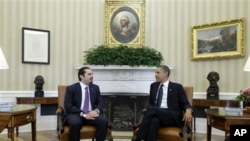The government of Lebanon collapsed Wednesday, shortly after Prime Minister Saad Hariri met with President Barack Obama at the White House. Top U.S. officials have condemned the move by Hezbollah and its allies to bring the government down.
President Obama and Prime Minister Hariri reaffirmed their commitment to strengthening Lebanon’s sovereignty and independence, even as the government in Beirut was collapsing.
After the meeting, the White House released a written statement, saying in part, "The efforts by the Hezbollah-led coalition to collapse the Lebanese government only demonstrate their own fear and determination to block the government’s ability to conduct its business and advance the aspirations of all of the Lebanese people."
According to the statement, Mr. Obama commended the prime minister for his "steadfast leadership and efforts to reach peace, stability and consensus in Lebanon under difficult circumstances."
Lebanon’s year-old unity government came down when Hezbollah ministers and their allies resigned over the United Nations-backed tribunal investigating the 2005 assassination of then-Prime Minister Rafik Hariri, the father of the current leader.
Hezbollah, which is backed by Iran and Syria, denies involvement in the assassination and has denounced the tribunal.
Edmund Ghareeb, professor of Middle East history at American University in Washington, says the timing of the resignations to coincide with Mr. Hariri’s visit to Washington was intentional.
"Hezbollah and its allies wanted to send a message that they were very unhappy with the failure to reach an agreement on the court," said Edmund Ghareeb. "And also, probably, they wanted to send a message to Washington, because they believed that Washington was interfering."
The White House statement says President Obama stressed the importance of the tribunal’s work as a way of helping to end what it called "the era of political assassinations with impunity in Lebanon."
A return of the violence which wracked Lebanon in 2008 is possible, according to Rand Corporation senior analyst Fred Wehrey. But he says Hezbollah will probably try to avoid it, because the fighting three years ago was a setback for the group.
"That proved tremendously damaging to Hezbollah’s domestic standing, and Hezbollah has become a very astute political player over the years," said Fred Wehrey. "It survives and it succeeds in Lebanon through forming alliances and building domestic legitimacy, and that move proved very damaging to its legitimacy."
Mr. Obama and Prime Minister Hariri discussed efforts with France, Saudi Arabia and others to maintain calm in Lebanon and allow the tribunal to continue its work.
An earlier White House statement said President Obama spoke with Saudi Arabia’s King Abdullah by telephone on Tuesday night.
Among other topics, they discussed ways to support Mr. Hariri and Lebanon’s sovereignty, independence and stability.
Mr. Obama also discussed Lebanon with French President Nicolas Sarkozy in their White House meeting on Monday.
Obama Meets With Hariri; Lebanese Government Collapses




